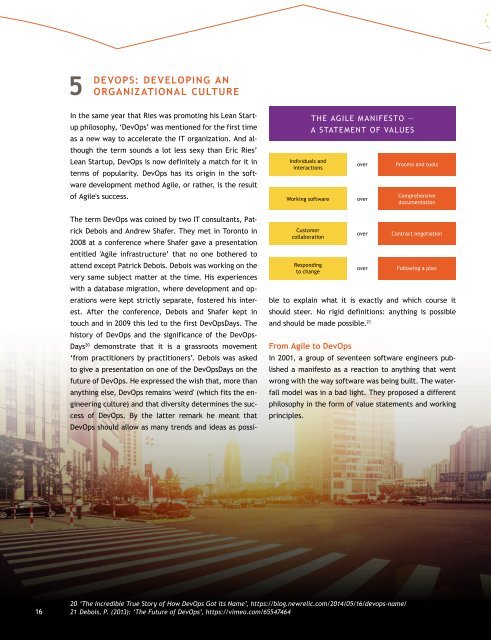DESIGN TO DISRUPT
1LHu2nv
1LHu2nv
You also want an ePaper? Increase the reach of your titles
YUMPU automatically turns print PDFs into web optimized ePapers that Google loves.
5<br />
DEVOPS:<br />
DEVELOPING AN<br />
ORGANIZATIONAL CULTURE<br />
In the same year that Ries was promoting his Lean Startup<br />
philosophy, ‘DevOps’ was mentioned for the first time<br />
as a new way to accelerate the IT organization. And although<br />
the term sounds a lot less sexy than Eric Ries’<br />
Lean Startup, DevOps is now definitely a match for it in<br />
terms of popularity. DevOps has its origin in the software<br />
development method Agile, or rather, is the result<br />
of Agile's success.<br />
The term DevOps was coined by two IT consultants, Patrick<br />
Debois and Andrew Shafer. They met in Toronto in<br />
2008 at a conference where Shafer gave a presentation<br />
entitled 'Agile infrastructure’ that no one bothered to<br />
attend except Patrick Debois. Debois was working on the<br />
very same subject matter at the time. His experiences<br />
with a database migration, where development and operations<br />
were kept strictly separate, fostered his interest.<br />
After the conference, Debois and Shafer kept in<br />
touch and in 2009 this led to the first DevOpsDays. The<br />
history of DevOps and the significance of the DevOps-<br />
Days 20 demonstrate that it is a grassroots movement<br />
‘from practitioners by practitioners’. Debois was asked<br />
to give a presentation on one of the DevOpsDays on the<br />
future of DevOps. He expressed the wish that, more than<br />
anything else, DevOps remains 'weird' (which fits the engineering<br />
culture) and that diversity determines the success<br />
of DevOps. By the latter remark he meant that<br />
DevOps should allow as many trends and ideas as possi-<br />
Individuals and<br />
interactions<br />
Working software<br />
Customer<br />
collaboration<br />
Responding<br />
to change<br />
THE AGILE MANIFES<strong>TO</strong> —<br />
A STATEMENT OF VALUES<br />
over<br />
over<br />
over<br />
over<br />
Process and tools<br />
Comprehensive<br />
documentation<br />
Contract negotiation<br />
Following a plan<br />
ble to explain what it is exactly and which course it<br />
should steer. No rigid definitions: anything is possible<br />
and should be made possible. 21<br />
From Agile to DevOps<br />
In 2001, a group of seventeen software engineers published<br />
a manifesto as a reaction to anything that went<br />
wrong with the way software was being built. The waterfall<br />
model was in a bad light. They proposed a different<br />
philosophy in the form of value statements and working<br />
principles.<br />
16<br />
20 ‘The Incredible True Story of How DevOps Got Its Name’, https://blog.newrelic.com/2014/05/16/devops-name/<br />
21 Debois, P. (2013): ‘The Future of DevOps’, https://vimeo.com/65547464


